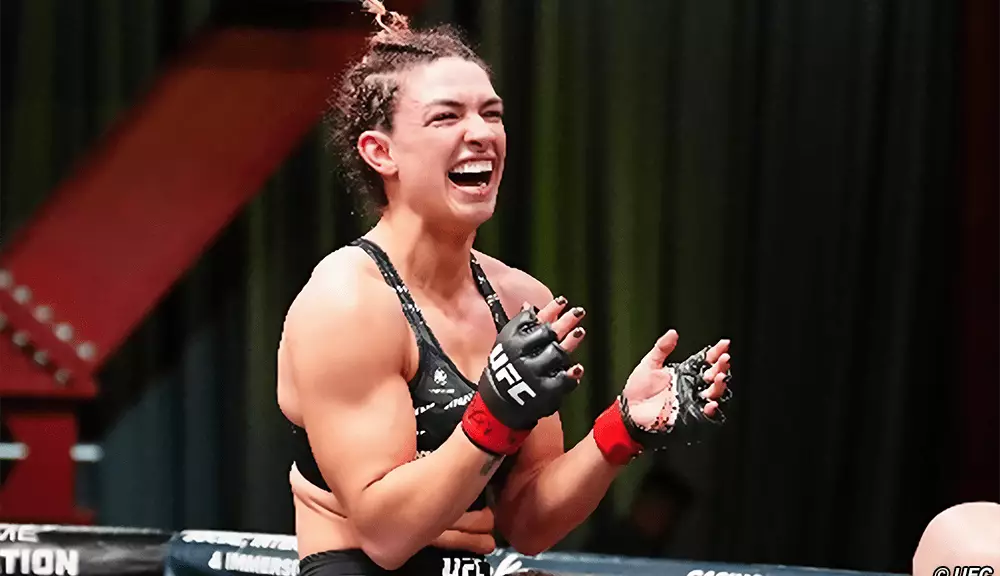Mackenzie Dern’s recent victory at UFC Fight Night 249, where she submitted Amanda Ribas, once again showcased her undeniable skills as a mixed martial artist and a jiu-jitsu practitioner. With a professional record now standing at 16 wins and 5 losses, it seems that Dern should be riding a wave of momentum towards a title shot. However, critical voices in the MMA community, such as former fighter Chael Sonnen, suggest that Dern has not properly marketed herself nor capitalized on her successes to ascend the ranks of the UFC. This article explores Sonnen’s critiques while examining Dern’s approach to her MMA career, her promotional strategies, and the broader implications of branding in professional sports.
In combat sports, mere talent and proficiency in the ring are often insufficient for a fighter to achieve landmark success. The sport thrives on personality, engagement, and the ability to articulate one’s aspirations and narratives to the audience and decision-makers. Sonnen’s criticisms hinge upon the idea that Dern has not effectively leveraged her jiu-jitsu background and fighting skills to ascend to the championship level. He expresses disappointment that she has not seized opportunities for self-promotion, particularly after headline events that could enhance her visibility within the sport.
Even in the aftermath of her impressive submission victory, Dern’s focus on improving her skills instead of capitalizing on her current momentum raises questions about her career strategy. While honing one’s craft is undeniably critical, in an era where fighters such as Conor McGregor and Israel Adesanya have thrived by building larger-than-life personas, the lack of marketing acumen can be detrimental to a fighter’s trajectory.
Sonnen mentions that Dern has opted to focus more on her striking instead of enhancing her already formidable grappling skills, suggesting that this shift might not have yielded the desired improvements. He alludes to her even departing from the tutelage of her father, a renowned figure in the jiu-jitsu community, to pursue this path. This raises critical discussions about how fighters must navigate the balance of skill development, legacy, and marketability.
One could argue that establishing a fan base depends on engaging with them beyond the octagonal walls. Fighters who master the ability to narrate their journeys, share their struggles, and create compelling storylines around their fights can transcend the boundaries of professional sports, leading to endorsements, larger fan followings, and the ultimate prize: title shots.
Despite Sonnen’s assertive commentary on Dern’s missed opportunities for self-promotion, the reasons behind her lower visibility are multifaceted. Engagement in the public sphere through social media, interviews, and community events can serve as pivotal tools for brand-building. While Sonnen acknowledges that she possesses charm and relatability, he insinuates that these qualities have not been capitalized on to the fullest extent.
The MMA landscape thrives on narratives, rivalries, and character arcs that captivate audiences. A fighter’s capacity to transform personal experiences into relatable marketing is critical. In this light, Dern’s allusions to her hardships and her passions could serve as powerful components of her identity, enhancing her image as a fighter and increasing her marketability.
Looking forward, it is crucial for Dern to reassess her approach as she navigates her career. The present moment offers an opportunity for her to rethink not just the direction of her training, but also her engagement strategies within and outside the octagon. If she wishes to assert her demand for a title shot meaningfully, it may be time for her to partner her grappling excellence with an assertive promotional narrative that encompasses her own brand.
In summation, while Mackenzie Dern possesses the skills and talent to compete at the highest levels of MMA, misunderstanding the fundamental nature of marketability may inhibit her journey. Navigating the dual paths of technical mastery and self-promotion requires skill akin to that needed inside the ring, and by synergizing both elements, Dern could revolutionize her career trajectory. Whether or not these changes will manifest in her future fights remains to be seen, but the conversation around marketability in MMA is more relevant than ever.

